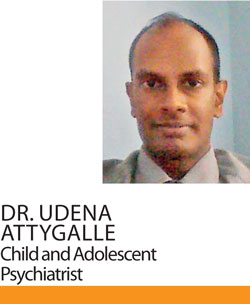28 Jun 2017 - {{hitsCtrl.values.hits}}

 ‘Depression’ is a hot topic amongst the social media community these days. It is refreshing to see some of the stigma attached to mental illnesses being washed off by the younger generation.
‘Depression’ is a hot topic amongst the social media community these days. It is refreshing to see some of the stigma attached to mental illnesses being washed off by the younger generation.
Still, there are so many in society, including those who are closest to us, who suffer silently without seeking treatment for the fear of being stigmatized. Therefore, we have many more things to learn and a long way to go in the field of attitudes when it comes to depression.
According to the WHO, 4-8% of the adolescent population is suffering from depression. With major changes taking place in their lives both physically and emotionally, along with many stressors like exams and conflicts with adults, it is important for both parents and children to be aware of the subject, to identify depression in its first stages and seek help. That is why we decided to consult Dr. Udena Attygalle, Child and Adolescent Psychiatrist, to elaborate on the topic.
About Depression
Some people mistake sadness for depression, but depression is something more serious than a period of sadness. Someone who is depressed may feel low and sad, lack the usual energy they had and be easily fatigued. They may also suffer from a lack of enjoyment and loss of interest in things they enjoyed. These issues have to be persistent and they may find it difficult to get out of this state of sadness and low mood.
Adolescents and young people may deal with it in different ways. For example, they may be more irritable and angry than sad. Sometimes, they may appear to be coping fine but may be struggling alone with their emotions. While depression is rarer in children, deterioration in academic work for no apparent reason and being persistently clingy or withdrawn, may be signs of depression in this age group.
Additionally, they may have difficulty concentrating, feel guilty and hopeless or think of suicide and have disturbances in sleep and appetite.
There could be different degrees of depression as well. Thus, someone with mild depression may continue to work and engage in day-to-day activities, while someone with a more severe form may not be able to do these things.
What causes Depression?
While our genes make us vulnerable to depression, issues such as loss and grief over someone or something we held dear may trigger depression in some (relationship, break-ups or even failure at exams can be losses that are difficult to bear). There may also be other issues that go along with depression, like anxiety. This is especially so in the case of children and adolescents.
Although many people with depression will not have any thought of suicide, in certain circumstances, this may be the case. The persistent sadness, together with a sense of hopelessness and inescapability, may sometimes be too much to bear.
Is suicide always related to depression?
There are many other risk factors for suicide. Impulsiveness and being unable to regulate emotions can be factors, especially in the case of adolescents and young people. There are many protective factors as well, such as family and community support, easy access to clinical care, appropriate treatment of mental health conditions as well as skills in solving problems and resolving conflicts.
How can you help?
Even though clinically diagnosing depression will require the expertise of a trained professional, providing a supportive non-intrusive environment and helping the person solve or deal with their problems will help relieve their burden. Assuring them that depression is like any other illness and is nothing to be ashamed of, and linking them up with a professional who can help, will go a long way towards changing their lives for the better.
Treatment
Appropriate treatment is important, as most with depression can be helped and will improve with treatment and continue on with their lives.
Even though providing a supportive environment and helping the patient cope with, or resolve problems might be the only thing that is needed, in some cases, other types of psychotherapy (talking therapies) and medication can be useful.
Advice to parents
In the case of children and adolescents, a secure emotional attachment with parents can be an important factor. With emotional attachment comes a sense of security that their parents will be there for them to fall back on, but will also allow them to grow as individuals. Thus, while this will give the adolescents the confidence to deal with difficult situations, they will also feel secure in knowing that if things go wrong they will be accepted and helped.
Again, as adolescents can struggle with the emotional aspects of relationships, parents who are able to contain situations emotionally in their interactions with their adolescents can better help the adolescents themselves contain and regulate their emotions.
Resilience is the process of adapting to adversity and other stressors so that they are able to “bounce back” from difficult experiences with more ease.
Building up resilience in our children from a young age may also help them cope with difficulties later in life.
23 Dec 2024 9 hours ago
23 Dec 2024 23 Dec 2024
23 Dec 2024 23 Dec 2024
23 Dec 2024 23 Dec 2024